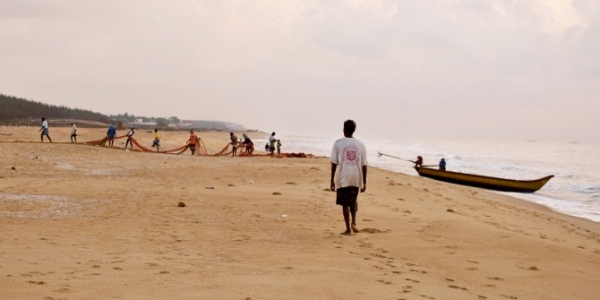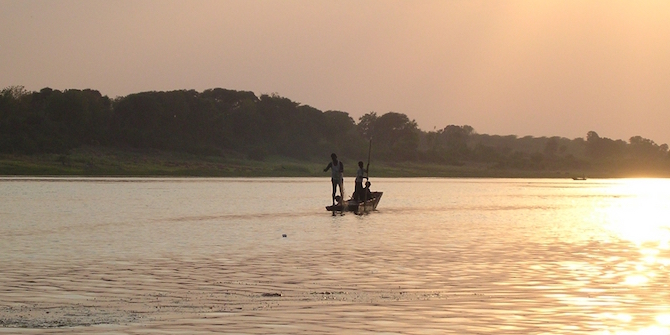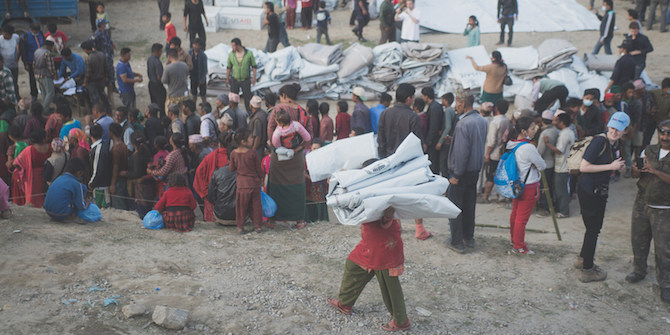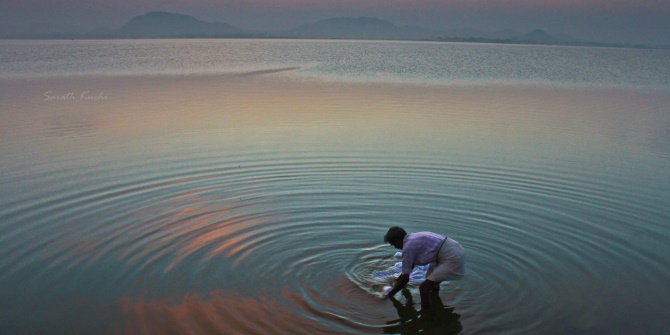
 Indian and Sri Lankan fishermen are often in the news having been arrested for crossing maritime borders. Niroshika Liyana Muhandiram and Mohit Gupta write that this is not a bilateral issue but a regional one, and outline how fora such as SAARC and BIMSTEC could assist in coming up with long term solutions to fishing-related conflicts.
Indian and Sri Lankan fishermen are often in the news having been arrested for crossing maritime borders. Niroshika Liyana Muhandiram and Mohit Gupta write that this is not a bilateral issue but a regional one, and outline how fora such as SAARC and BIMSTEC could assist in coming up with long term solutions to fishing-related conflicts.
Tensions over fishing in the Palk Straits have severely impacted the bilateral relationship between India and Sri Lanka and adversely affected the 500,000 fishermen living on both sides of the maritime border. Fishermen from both countries are periodically arrested and have their boats seized for straying into their neighbour’s territorial waters. There have also been multiple incidents where fishermen have been fired on: earlier this year the Sri Lankan Navy shot and killed one Indian and injured three others when they were caught fishing in the island nation’s waters.
The dispute was born out of agreements between India and Sri Lanka in 1974 and 1976, which demarcated maritime borders without establishing any cooperation mechanism for fishermen. This was a notable oversight as similar agreements struck between other countries have always included some kind of instrument for cooperation. For instance the 2013 agreement signed between Japan and Taiwan created the joint fisheries committee, an institutionalised joint management mechanism created under the principle of equality that aims to maintain order in fishing operations and preserve bio-resources.
A regional approach to fishing disputes
Although at first sight the fishermen issue is a bilateral one, it would benefit from being addressed at the regional level for three reasons. Firstly, disputes of a similar nature have arisen between Sri Lanka and the Maldives, India and Pakistan, and India and Bangladesh. Developing a regional mechanism would therefore be beneficial for all South Asian countries with coastal borders.

Secondly, overfishing poses a serious threat to marine ecosystems in the Indian Ocean. In 2006, the UN Secretary General reported that 95 per cent of the damage to seamount ecosystems worldwide was due to ‘bottom trawling’ (dragging large nets along the sea floor). As a result the use of trawlers have been banned and regulated in various places, including the countries which border the Mediterranean Sea, New Zealand and Sri Lanka. However, Indian fishermen do use trawlers, which has significantly reduced fish density on the Indian side of the maritime border in the Palk Straits. This creates incentives for Tamil Nadu fishermen to stray into Sri Lankan waters where fish stocks are healthier. However, when the trawlers cross the border it puts the livelihoods of Sri Lankan fishermen at risk and threatens to exhaust the marine resources of the whole area.
Thirdly, this issue has direct trade implications because marine foods are a key export for South Asian countries. Thus if an effective system for settling fishing-related disputes is not developed and efforts are not made to guarantee sustainability it will impact both national economies and global trade.
Seeking solutions through regional fora
South Asian countries could look to the European Union for guidance in striking regional agreements relating to fishing and fisheries. For example, the EU developed the Common Fisheries Policy in the 1970s, and has updated it periodically ever since. The CFP regulates the rules around who can fish where and lays out measures to preserve fish stocks. In 2016 provisions were agreed for a new regulation which will restrict and regulate bottom trawling. Thus similar cooperation can be envisaged through the regional organisations that exist in South Asia.
The South Asian Association for Regional Cooperation (SAARC) is the obvious forum through which to develop regional solutions to issues relating to the fishing industry. SAARC is often written off due to mutual distrust, geopolitical factors, and ethnic atrocities. However, its Charter does offer a framework which aims to promote the welfare and improve the quality of life of peoples in the region, accelerate economic growth and opportunities for individuals to realise their potential, contribute towards mutual trust, and to promote active collaboration and mutual assistance across economic, social, and technical fields. It is therefore well-positioned to take on persistent regional disputes over illegal fishing across borders.
There are several ways in which SAARC could offer assistance. The main drivers for illegal fishing are economic vulnerability, a lack of awareness about maritime boundaries and the consequences of illegal fishing, and ignorance about the harmful ecological effects of using trawlers. Establishing an Action Committee to organise awareness building programmes would therefore be a valuable first step.
SAARC could also promote systems to enable fishermen to enter the territorial waters of a neighbouring country in a regulated manner. For example, a Foreign Fishing License Scheme which would provide fishermen with permits to cross maritime borders might be considered. Vessel tracking devices in fishing boats could provide greater transparency over where fishermen are casting their nets, and therefore build trust between countries.
SAARC can also propose Regional Guidelines on illegal, unreported and unregulated (IUU) fishing practices to provide a framework for dealing with transgressions. This could draw on the regulations drawn up by the EU in 2008 as a blueprint. Joint patrolling is another possible mechanism. Australia and Indonesia currently collaborate in this way to combat IIU fishing. A SAARC Action Committee could also foster joint patrolling in the Indian Ocean, while guaranteeing the territorial integrity of the countries involved.
BIMSTEC (Bay of Bengal Initiative for Multi Sectoral Technical and Economic Cooperation) is alternative sector-driven cooperative organisation through which issues relating to fishing are already being addressed. Fisheries are one of the six priority areas of economic cooperation listed. In 2001 a Fisheries Expert Group Meeting was convened in Thailand and members agreed to undertake collaborative research into Ecosystem-based Fishery Management in the Bay of Bengal. More recently, the leaders of all the member countries reaffirmed their commitment to “cooperation in the sustainable development of fisheries in this region” at a retreat in Goa. This signals that there is potential for India, Sri Lanka and Bangladesh to iron out their disagreements over fishing through BIMSTEC.
Conclusion
It could be said that the fisherman issue offers a great opportunity for regional fora to show that they are potent enough to peacefully resolve tensions between members. SAARC and BIMSTEC must therefore harness this opportunity and proactively offer solutions to foster long term cooperation and protect maritime ecosystems in South Asia.
This article gives the views of the authors, and not the position of the South Asia @ LSE blog, nor of the London School of Economics. Please read our comments policy before posting.
About the Authors
 Niroshika Liyana Muhandiram is Advocate at Supreme Court of Sri-Lanka, and is currently pursuing Masters in International Law from the South Asian University
Niroshika Liyana Muhandiram is Advocate at Supreme Court of Sri-Lanka, and is currently pursuing Masters in International Law from the South Asian University
 Mohit Gupta is Advocate at Allahabad High Court and is currently pursuing Masters in International Law from the South Asian University
Mohit Gupta is Advocate at Allahabad High Court and is currently pursuing Masters in International Law from the South Asian University







